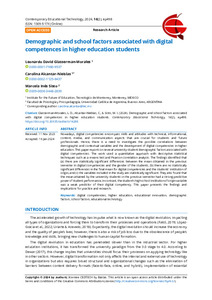Por favor, use este identificador para citar o enlazar este ítem:
https://repositorio.uca.edu.ar/handle/123456789/18345| Campo DC | Valor | Lengua/Idioma |
|---|---|---|
| dc.contributor.author | Glasserman Morales, Leonardo David | es |
| dc.contributor.author | Alcantar Nieblas, Carolina | es |
| dc.contributor.author | Sisto, Marcela Inés | es |
| dc.date.accessioned | 2024-06-27T11:46:50Z | - |
| dc.date.available | 2024-06-27T11:46:50Z | - |
| dc.date.issued | 2024 | - |
| dc.identifier.citation | Glasserman Morales, L. D., Alcantar Nieblas, C., Sisto, M. I. Demographic and school factors associated with digital competences in higher education students [en línea]. Contemporary Educational Technology. 2024, 16 (2). doi: 10.30935/cedtech/14288. Disponible en: https://repositorio.uca.edu.ar/handle/123456789/18345 | es |
| dc.identifier.issn | 1309-517X (online) | - |
| dc.identifier.uri | https://repositorio.uca.edu.ar/handle/123456789/18345 | - |
| dc.description.abstract | Abstract: Nowadays, digital competencies encompass skills and attitudes with technical, informational, content, media, and communication aspects that are crucial for students and future professionals. Hence, there is a need to investigate the possible correlations between demographic and contextual variables and the development of digital competencies in higher education. This paper reports on several university-student demographic factors associated with digital competencies. The work used a quantitative approach with descriptive statistical techniques such as a means test and Pearson correlation analysis. The findings identified that (a) there are statistically significant differences between the mean obtained in the previous semester in digital competencies and the gender of the students, (b) there are no statistically significant differences in the final mean for digital competencies and the students’ institution of origin, and (c) the variables included in the study are statistically significant. They also found that the mean attained by the university students in the previous semester had a strong predictive power of student performance; in contrast, the student’s high school institution of origin variable was a weak predictor of their digital competency. This paper presents the findings and implications for practice and research. | es |
| dc.format | application/pdf | es |
| dc.language.iso | eng | es |
| dc.publisher | Bastas Publications | es |
| dc.rights | Acceso abierto | * |
| dc.rights.uri | http://creativecommons.org/licenses/by/4.0/ | * |
| dc.source | Contemporary Educational Technology. 2024, 16 (2). | es |
| dc.subject | EDUCACION SUPERIOR | es |
| dc.subject | COMPETENCIAS DIGITALES | es |
| dc.subject | INNOVACION EDUCACIONAL | es |
| dc.subject | DEMOGRAFIA | es |
| dc.subject | TECNOLOGIA EDUCACIONAL | es |
| dc.title | Demographic and school factors associated with digital competences in higher education students | es |
| dc.type | Artículo | es |
| dc.identifier.doi | 10.30935/cedtech/14288 | - |
| uca.disciplina | PSICOPEDAGOGIA | es |
| uca.issnrd | 1 | es |
| uca.affiliation | Fil: Glasserman Morales, Leonardo David. Tecnológico de Monterrey. Instituto para el futuro de la educación; México | es |
| uca.affiliation | Fil: Alcantar Nieblas, Carolina. Tecnológico de Monterrey. Instituto para el futuro de la educación; México | es |
| uca.affiliation | Fil: Sisto, Marcela Inés. Pontificia Universidad Católica de Argentina. Facultad de Psicología y Psicopedagogía; Argentina | es |
| uca.version | publishedVersion | es |
| item.fulltext | With Fulltext | - |
| item.grantfulltext | open | - |
| item.languageiso639-1 | en | - |
| Aparece en las colecciones: | Artículos | |
Ficheros en este ítem:
| Fichero | Descripción | Tamaño | Formato | |
|---|---|---|---|---|
| demographic-school-factors.pdf | 220,76 kB | Adobe PDF |  Visualizar/Abrir |
Este ítem está sujeto a una Licencia Creative Commons

